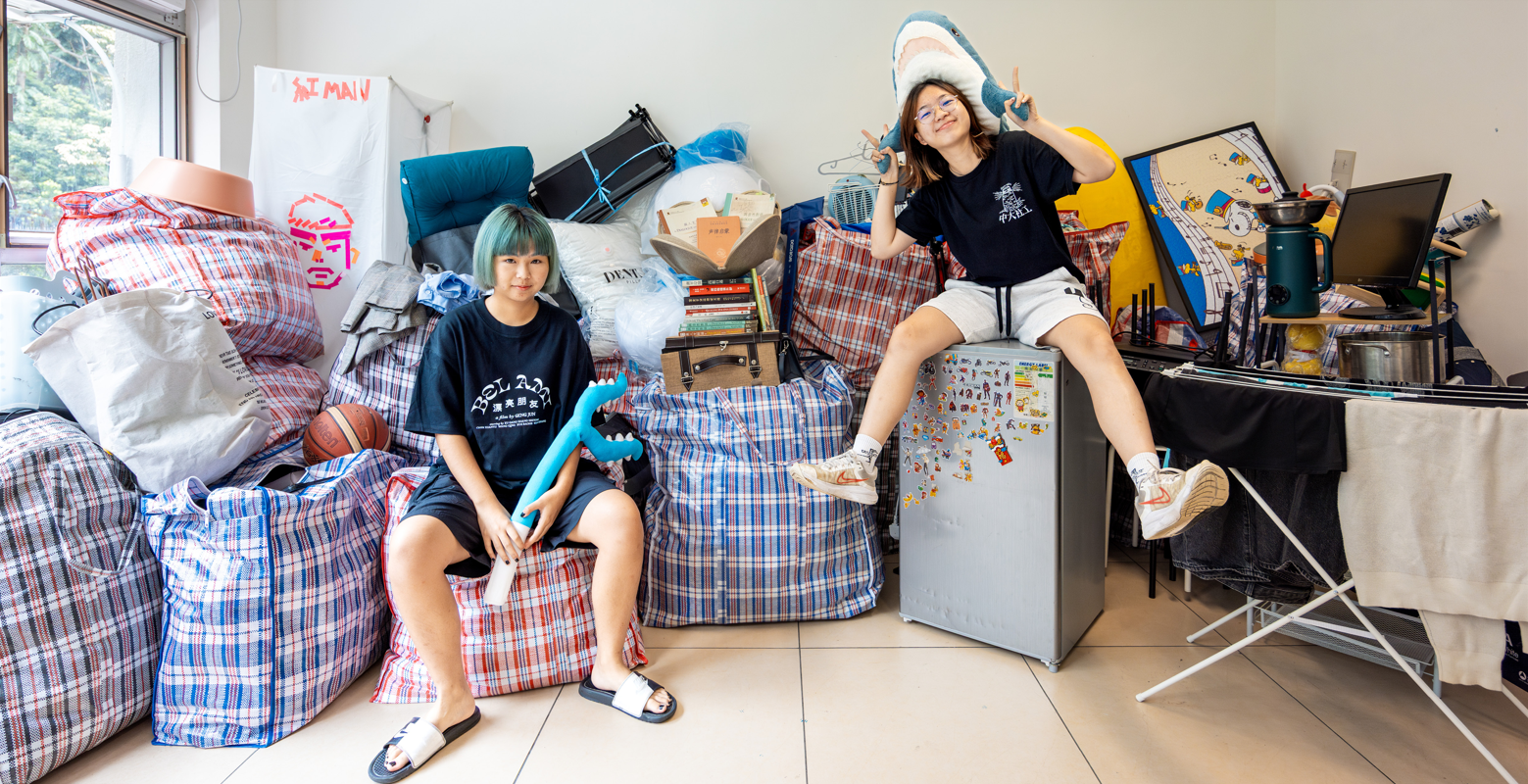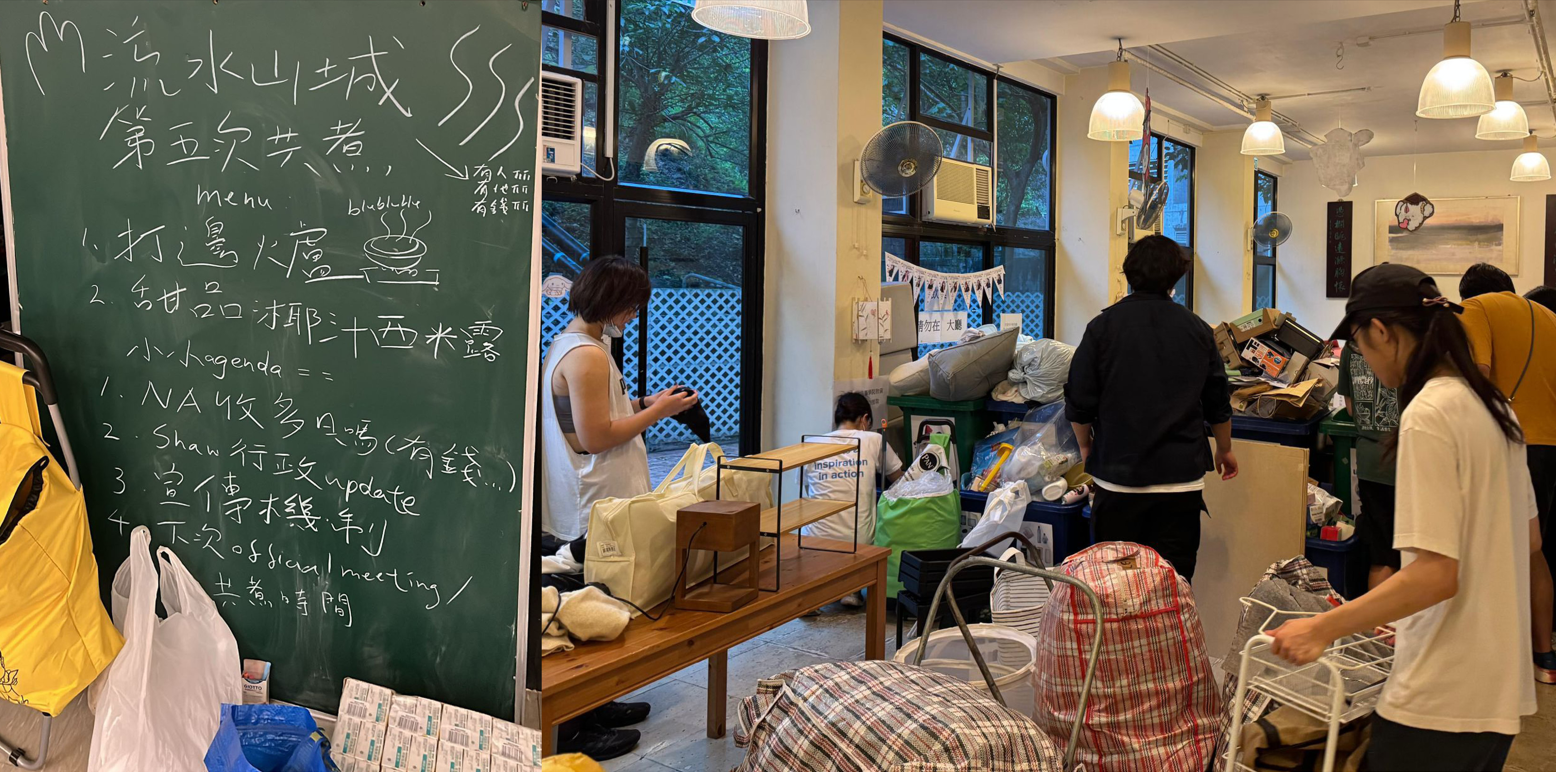

Compared to last year, with significant contributions from the student group Lau4Seoi2Saan1Sing4 (which means “Streams flow into the mountain city”, simplified as Lau4Seoi2), the College’s Hostel Checkout Recycling program this year achieved a more jubilant result. Peace So and Carmen Fu, both third-year social work students and core members of Lau4Seoi2, will share what they have done to bring change to Chung Chi and even the University.
(P/ Peace C/ Carman)
Q: How did you come to know Lau4Seoi2, and why did you join in?
C: I joined Lau4Seoi2 during its founding in the 2023/24 academic year. I recall that its founder was campaigning for the Representative Council of the Chung Chi College Student Union, and I struck up a conversation out of curiosity. He mentioned Lau4Seoi2 and invited me to a group cooking event, and later I learned that the group was far more than a dining club, as it had been focusing on “community building”. Group cooking was a primary means of achieving that, where like-minded students came together and discussed the possibilities of improving CUHK community. The Hostel Checkout Recycling was an idea conceived from these discussions, which strongly aligned with my environmental values, motivating me to join and stay involved.
P: I was not a founding member of Lau4Seoi2, but my social network involved the Student Union or the social work department, from which the core members of Lau4Seoi2 mainly originated. Although it emerged with a well-crafted roadmap, Lau4Seoi2 was facing shortage of successors at that time, so I joined the group this academic year to ensure its continuation. Lau4Seoi2 is nobly positioned as a student-initiated, community-building group. Given its scale and operations spanning across the university, I saw its potential to do more for Chung Chi and CUHK, and I wanted to contribute to its development.
Q: How is Lau4Seoi2 different from typical student organisations?
C: Lau4Seoi2 is not a registered student organisation, positioned as “outside the system” — self-initiated and cross-identity. Students at the university are often confined by “institutional labels” like departments or societies. In contrast, we have no such restrictions. It allows members to focus on their own issues while engaging with other perspectives. This also reflects social work values — how do different individuals coexist with one other?
P: Lau4Seoi2 is boundaryless. Participants can flow freely like water without being tied to a system. Carman and I have been exploring feminism, which emphasises equality and individual care, and this likely influences us to address the needs of “every droplet” equally. For example, our internal meetings include Check-in and Check-out sessions, where participants can share their conditions or evaluate the meeting’s effectiveness, and show care for those who are not in optimal condition. This design is inspired by our observations of some social welfare organisations: many people working for others’ well-being are trapped in mechanical labor without personal value. This is something we strive to avoid.
Q: Can you share your experience with Hostel Checkout Recycling this year?
C: To reduce garbage and waste products, we first held our on-campus hostel checkout recycling event last year, collecting intact items left by residents and redistributing them to students in the new academic year. However, as an unregistered group, Lau4Seoi2 was not familiar with the college staff, so we struggled to secure fixed locations to store the collected items, resulting in frequent relocations that reduced participation enthusiasm.
We set two goals for this year: securing fixed storage spaces and obtaining student helper salaries. The former reduces the burden of frequent relocations, while the latter reflects our belief that participants’ dedication to recycling benefits both CUHK’s students and the environment; this deserves support as it is one of the campus environmental initiatives with tangible impact.
P: We began contacting colleges in March. To secure cooperation, I reached out to student unions or representatives at other colleges to gather information and met with college staff to explain our work. Both Carman and I are CC students, so we first started negotiations with Chung Chi. The process went smoothly; our college provided both the student helper salaries, and a storage room located on the first floor of Chung Chi Tang, resolving the challenges we faced last year. This experience facilitated our persuasion of other colleges, leading to broader support for our recycling event. Still, Chung Chi’s support for us remains the strongest among all colleges.

Lau4Seoi2 organised group cooking event (left), and conducted hostel checkout recycling at Chung Chi (right).
Q: What significance does Lau4Seoi2 hold for you?
C: To me, it is profoundly moving. I sometimes cry at the end of group cooking events as I am touched by sincere sharing from participants. I remember one of them, who is studying energy and environmental engineering, said he can only meet environmentalists like him in Lau4Seoi2 instead of his department. Another participant joined every group cooking event because it gave her a sense of purpose in university life. Lau4Seoi2 can connect isolated individuals.
P: Today’s society is increasingly alienated, and our focus on community building is about restoring community mobilisation and rebuilding basic human connections and trust. We do not have an “ultimate blueprint” as community building embraces all possibilities. In this sense, Lau4Seoi2 is an ever-evolving, “work-in-progress” project. Furthermore, our members serve the CUHK community voluntarily, not because of rules or resources. The “from the bottom” spirit is a precious quality among university students.